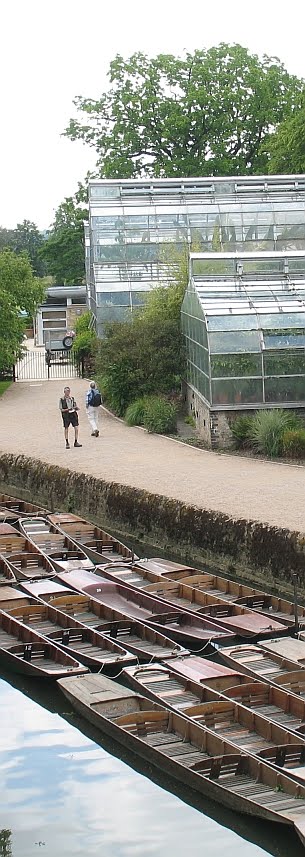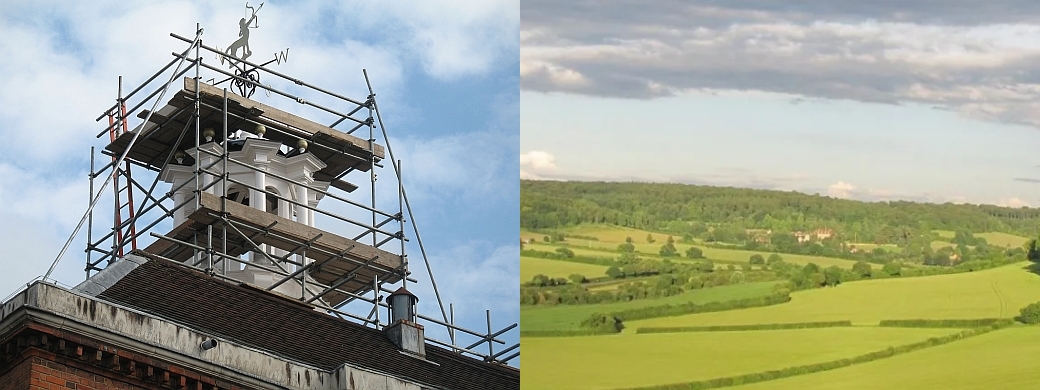
Oxford is everything that my own town is not, and it’s only 30 miles away. I decided Park and Ride was the best way to enter in triumph, using my new electronic bus pass, on a superb day in June, discovering that the students are in exams and the streets are a motley of tourists. Oxford is impressive, but that’s the whole point of it. Much of it was built when a king, or other potentate, proclaimed his glory through the endowment of poor students and their teachers, so they might be wedded to Learning; a pursuit requiring literacy, a skill mainly restricted to those in Holy Orders. Pomp, glory, religion, Latin, Greek, Church of England, celibacy—I think these were the desired norm, until the nineteenth century was fairly advanced.
Today, it’s clean, well-organized and beautiful, in its own manner. There are many places to dispose of your surplus pocket-money on books, maps, pictures, pretty cakes, fountain-pens, classy antiques. I find myself imagining how it would be, living here, to become a professor of international renown; at twenty-one, a young blood, brilliant double-first and Blue; at my age a Prof. Emeritus, my once-original ideas now considered shallow, echoing hollow in the quads. To stay vigorous and relevant, one would need to escape the enervating Ivory Tower. Then I think of Richard Dawkins. He lives in the city, in Summertown, I’m told.
Sidewalks are clogged with groups clustered round guides who point out the sights, relate their history. I’m glad I can just float along pursuing my non-agenda, soaking up the vibe—or not, as I please; reserving the right to be impressed, or not. I feel the sharp edge of glittering intellects, as a constant fencing-match of privilege and fashion, backed up by centuries of the same: it’s in the very air I breathe, stimulating me to improve my game, as a worthy opponent does for a tennis-player. This is where la crème de la crème gathers. Here, like filings to a magnet, come Rhodes Scholars from corners of the globe. I pass an impressive building with a Latin inscription which I translate roughly as “After despoiling Africa, Cecil Rhodes was noble enough to endow this building and scholarships to perpetuity.”
Speaking of despoliation, see the attached sign. BILL POSTING AND OTHER DESPOILATION OF THIS BUILDING IS FORBIDDEN BY ORDER OF THE DEAN NEW COLLEGE OXFORD PERPETRATORS WILL BE PROSECUTED. There is no such word as despoilation. Oxford’s very own English Dictionary confirms this. How many cities have their own dictionary? You’d think those which do would take trouble to use them, before nailing up public signs. Despoliation means robbery or plundering, which bill-posting is not. Robbery is contrary to common law, as every child knows, so cannot be in need of a sign. To put up a misworded and misspelt sign under the authority of the Dean of New College Oxford is despoliation, for it plunders any reputation the College may possess for scholarship. Its fustian grandiloquence is laughable: what’s wrong with ‘Bill Posters Will Be Prosecuted’, apart from provoking the inevitable graffito, ‘Bill Posters Is Innocent’?
I’m outside Basil Blackwell’s famous bookshop, sitting on a bench to write this, when a thought pops up: for me, the safe place to be is on the edge of nothing. I don’t mean nothingness, with all its philosophical flummery, Sartre’s Being and Nothingness, and so forth, but just plain simple nothing. Simple life, simple death. I imagine myself clinging to a safety-rail at the edge of an abyss. What more do I need? Not that I see any vertiginous chasm in my own life; only everyday examples of hopelessness, such as you meet on every street, at any rate in my home town. Why is it that in tourist traps, or should I say world-class cities like Oxford, the shambling examples of hopelessness are so much more lurid and gaudy? I’m not even talking about beggars, just people like you and me going about our business, but with some tell-tale sign, some stigma, that says they have nothing going for them, and they know it?
One of my favourite novels, unknown in any list of great books, ignored by the critics, passed over even by the small clique of its author’s aficionados, is Wood and Stone, by John Cowper Powys, first published in 1915. In his Preface, he refers to “that world-old struggle between the ‘well-constituted’ and the ‘ill-constituted’, which the writings of Nietzsche have recently called so startlingly to our attention.”. He goes on to say, “In a universe whose secret is not self-assertion, but self-abandonment, might not the ‘well-constituted’ be regarded as the vanquished, and the ‘ill-constituted’ as the victors?” Well, he may be right, and his novel demonstrates how it can work. But for me, and I don’t know why, despite greatly admiring the insights of Nietzsche, I’ve yet always had, like Powys, an instinctive and unreasoned compassion for the ill-constituted, those pathetic creatures who remain vanquished, except in the imagination of a romantic few. At least let them be victors in their own imaginations! That is all that matters.
So this is how I immunise myself, unconsciously, against the pomp and glory of Oxford, this paradise for the well-constituted. And then I remind myself that it’s founded on money, the kind of ill-gotten wealth which in all ages has needed top-class money-laundering, the kind you can only get by endowing a college. Speaking of which, I photographed an inscription on a building, which appears to be dated MCMLX (1960). I assume it records someone’s philanthropy in abbreviated Latin: someone shy enough to reveal his name only in coded form.
Do you think I am bitter against Oxford? I have no reason for such feelings. My first visit to the town was in November 1959. My headmaster had sent me to compete for a scholarship at Worcester College. Nobody from my school had been to university in living memory, but he had tried to prepare me, by discussing current affairs and making sure I read The Times. The big story was Colonel Nasser’s leadership in Egypt. The British were not keen on what he was doing, that was the main thing I recall. As for the academic side, English Lit and so on, the headmaster thought he could safely leave that to me.I arrived at a rainy Oxford, after dark. I had a bad cold and should have stayed in bed. I know it was 1959 because I went to see ‘Journey to the Centre of the Earth’, starring Pat Boone, at the Odeon cinema—it’s still there, just as I remembered it. Next morning, I was in no state to sit the papers, do the essays, and the same evening I flunked my interview with two dons in the twilight of some book-lined study. I easily fell for a trap, when they asked me about how I would interpret lines by the poet John Donne. But I don’t hold that against Oxford. I would have failed even without the cold.
I go to look in Blackwell’s window. On prominent display is a book of memoirs by Christopher Hitchens: Hitch-22. I go in, browse its pages, discover that the author is mortally ill from oesophageal cancer. (As soon as I get home I check Wikipedia to make sure he’s still alive.) Apart from my instinctive urge to harbour no negative thought of the dead and dying, I find myself disliking his self-depiction. His militant atheism, as screamed from the title of his book god Is Not Great, seems at odds with the behaviour of an English gentleman who enjoyed the hospitality of Balliol College in his student days—in several ways. Being an obstinately obsessive egotist is one of them. Later, I forgive him the obstinate egotism: he’s on a mission, his days are numbered, let him plumb his own depths and speak his truth, whilst he has time! I download a sample of his book on my Kindle reader, but delete it before I’ve had time to read it, such is my antipathy to this apparent monster, I shall not engage him in debate, alive or dead.
But that happens later. Still in Oxford, pacing the streets, I look back on my life and how it unfolded, after I failed to secure the glittering prize of a scholarship to Oxford, which I’m certain I didn’t deserve. I note that I’ve somehow cultivated a policy of randomness in my life: a strategy which like certain types of spread-betting may take a lifetime to hit the jackpot. Randomness is the wrong word. At the time it appeared like choicelessness, which is perhaps the thing which has linked me to all the ‘ill-constituted’ persons who walk this earth—those who are physically able to walk. There is a voluptuous pleasure in choicelessness, if you can learn the trick. It is precisely this, dear Hitchens, now facing choicelessness yourself, which drives the ill-constituted and hopeless into religion. Who are we to push them off their life-raft?
I downloaded the sample of Hitchens’ memoir again, and read it this time. The first chapter is about his mother, whom he calls by her name, Yvonne. Now his sincerity starts to break through my mindless prejudice. I start to see who he is, make a distinction between him and Richard Dawkins, against whom I still uphold a prejudice. Hitchens, you arrogant swaggerer, Devil’s Advocate (yes, official, as once appointed by the Vatican), opponent of so many principles of behaviour I hold dear! You are a contrarian, that’s your role, a seeker of conflict, a partisan: this is how you want to contribute to the world’s betterment, not unlike your equally misunderstood predecessor, Nietzsche. I don’t say you are his equal, but this is not a competitive sport, even though I suspect you of being one of the world’s more competitive intellectuals. When I think about it, try naming anyone who claims to be an intellectual who is not driven by a competitive urge as compulsive as any racing driver!
Hitchens, you may yet do honour to Oxford, even as you have tried to subvert the selfsame religious foundations of your alma mater. At any rate, you are as showy as those who have endowed those dreaming spires, those ageless colleges and so forth. I think I may, after all, buy your book. You have, despite everything, endeared yourself to me. God bless you!
PS: A propos writing one’s autobiography—the thought occurs to me that most of the facts that I would want to include could not be verified by anyone else living. I decided therefore, if I ever get round to the final memoir, and don’t leave it too late to be of sound mind, that I shall compete with Hitchens for the brevity of Preface, Prologue or Foreword—let him choose his own weapon! Here’s what I shall say:



How do I know that any of this is true? I shall just have to take my own word for it. As for you, dear Reader, I’ll be delighted if you consider it fiction.

> How do I know that any of this is true? I shall just have to take my own word for it.
I like it. =)
LikeLike
heh .. first responses ..
“trespassers will be persecuted”
LikeLike
“enter in triumph” and the soundtrack in my mind is Elgar´s Pomp and Circumstance.
LikeLike
“Bill Posters is innocent.” That took me a second. I stumbled from what appeared to be bad grammar and fell head first into a mildly amusing joke.
LikeLike
Poor Bill, always getting accused. And him such a sweet and innocent a lad as you would ever find..
I've always wanted to visit Oxford. Not to study. Good heavens, no. Just to visit and see what all the hullabaloo is about. And soak in some history. The place is apparently rife with it. There was a line from one of Douglas Adams' books, I think it was “Dirk Gentlys Holistic Detective Agency”, much of which takes place there. Reg, a professor emeritus, points to a spot on a bridge and says “See that brick, just there? Yeats was once sick on that very brick.” You don't have that kind of thing over here.
LikeLike
Did you refer to Fowlers?
As the wonderfully despoiling sign is in Oxford, perhaps a new term/adjective will be coined even if it is by bizarre, ignorant, accident.
Dreaming Spires……blissfully dream on!
LikeLike
…I’ve yet always had, like Powys, an instinctive and unreasoned compassion for the ill-constituted, those pathetic creatures who remain vanquished, except in the imagination of a romantic few. At least let them be victors in their own imaginations! That is all that matters.
I don't know who Powys is but I share your sentiment for the pathetic creatures. 🙂
LikeLike
Matthew: the funny thing was, when I first read your comment, I didn’t realise you were quoting from me! I was ready to take issue with you, and defend myself. (Nothing unusual, I often argue with myself and lose.)
Davo: right, that was my first response too.
Luciana: yes, I love the idea of going down the street with one’s own personal soundtrack. The idea only. I never go around with wires sticking in my ears. But there’s a great song by Dire Straits about a girl roller-skater who dancing to the music she hears in her personal whilst weaving between the taxis in the street. My personal favourite is a scene from I’m Gonna Git You Sucka where the pimp goes down the street in his high-heeled boots (with live goldfish swimming in the heels) followed by his personal posse of musicians, playing his theme. There’s a street near us where this kind of tacky display would go down well.
LikeLike
Bryan, falling head first is the salt on the chip, even if it turns out to be not so crunchy.
Rev, do come to Oxford. To study is indeed a distraction from the main thing. How many undergraduates over the centuries have quickly come to that conclusion! Christopher Hitchens while at Balliol was one of them. Reading his memoir is like being there in 1968, the year of student unrest. He makes you think he started it all.
I seem to remember that Douglas Adams was at Cambridge, and that is where he went back to see his old prof Reg Chronotis, who was more Emeritus than most, having been at his college for several hundred years. “We don’t have that kind of thing over here?” What, no students are sick on bricks? Or perhaps it is so commonplace they are not remarked upon, or the vomiters are not sufficiently celebrated. We could start some campus tours: Brickword blessed by Henry James, Saul Bellow, J D Salinger et al, in moments of Inspiration Overflow.
LikeLike
ZACL, not Fowler’s, but the full OED: Oxford English Dictionary, now handily online to those of us with empty pockets and inadequate shelf-space: see http://www.oed.com/. If you are member of your local library, you should be able to use it for free access.
LikeLike
Pagan, I had thought of giving you a brief intro to John Cowper Powys, but instead I shall lazily give you links to articles I’ve written over the years on this man’s works:
Wood and Stone, his first published novel;
Peg Frampton, one of the characters in his novel Weymouth Sands;
his Autobiography;
Owen Glendower, an historical novel;
“The Feminine in Powys”, looking at female characters in five of his novels.
LikeLike
Anyway, Pagan, I forgot to come back to your main point – that we share this sentiment in favour of losers. That was the point, which I don’t think I conveyed too clearly, which inspired the post: the contrast between where I live (sandwiched between derelict factories, which fifty years ago attracted immigrant workers from Pakistan & St Vincent in the Caribbean, whose great-grand-children now play in these streets) and Oxford, darling of the great and learned for hundreds of years. Its glory tempted me, & I saw what might have been if Fate had dealt a slightly different hand; but I felt joy to be light and airy, carrying none of that baggage, a Diogenes alongside the great Temple.
LikeLike
You are correct, of course. It was Cambridge. I'm a dunce. What I meant was we don't have that sense of history going back forever like parts of the Old World do. The most we have here are battlefield plaques and the occasional “George Washington slept here” sign. The man apparently slept an awful lot, judging from the plethora of such signs.
LikeLike
Can we not put a more optimistic gloss on 'choicelessness' and call it serendipity?
That's what i'm trying for anyway.
LikeLike
I would very much like to put the optimistic gloss on choicelessness, Steve, and call it serendipity. However, it doesn’t fit, except sometimes. The OED has this for serendipity: ‘The faculty of making happy and unexpected discoveries by accident’.
Unfortunately, my random decisions (which appeared choiceless at the time) often resulted in unhappy discoveries. The ultimate consequence of the many wrong turnings was to end up in the serendipity of now. But that doesn’t make all the prior links in the chain of cause and effect serendipitous too.
Or does it?
LikeLike
Does serendipity require every discovery to be fortuitous?
I was pondering also the concept of 'despoilation'.
Being told 'that's not actually a word' is always a provocation.
My response is 'well maybe not yet'. What would we prefer as an alternative? Spoiling? Messing up? Defacing I suppose is the most obvious but despoilation has a certain something extra that i like…
I'm reminded of a moment in Friends where Joey is told by Chandler that 'supposably' is not a real word.
It's only a comedy of course so his ignorance is funny – but he's left pondering. Why not?
'Supposably. Supposably. Did they go to the zoo? Supposably.'
It is possible to suppose they did.
Why not indeed?
Lets not be too much at the mercy of our OECD*
Anyhow, my other thought was that when I had to go to Oxford to use the Bodleian I stayed at Merton and I rather liked the contrast of the high-minded world of the students and academics and the more workaday domain of the porters and cooks, gardeners and cleaners toiling among them. Unintentional though I'm sure the mistake was (and a comical attempt at sounding high-minded into the bargain) it leaves a grubby proletarian fingerprint on their immaculate façade and makes me smile.
*Oxford English Compulsive Disorder – the compulsion to correct people's usage without being asked.
LikeLike
OECD. Gad. I have that.
LikeLike
I'm fast becoming a fan of your elegant writing style and understated wit.
LikeLike
aha! a lovely post from you. very british in style 🙂
LikeLike
I feel more tolerant of polemicists like Hitchens as I get older…..they are like grit in an oyster shell.
Parts of Oxford are very different from the town centre….where most of the people appear to be downtrodden.
Was the cinema the large one on George St…..opposite the Four Candles pub? I went to a film or two there with M. She's the one who came with me to your old flat in HW a few years ago.
When I was younger I had no regard for Oxford University at all. That changed once my youthful idealism deserted me!
LikeLike
Yes, Bob, the one opposite the Four Candles. It was confirmed for me that this is the one by its proximity to Worcester College, where I was staying.
How is M? Are you still in touch?
So your youthful idealism and your regard for the University were mutually incompatible? Yes, I see how that could make sense.
LikeLike
Thanks Ghetu, I was feeling very proud to be British – or rather, to be English; which I think is like you being even prouder to be Bengali than to be Indian!
LikeLike
Susan thanks. I am becoming such a fan of your art that I want to ask you here and now if you will illustrate the cover of my book. There is plenty of time to think it over. I have not yet written the book!
LikeLike
Excellent, Steve. You make the pertinent point with some force, that there has to be someone to uphold the petty rules, or else it would be no fun to break them. And then where would we be? Getting our kicks from breaking the not-so-petty rules. Which is a fair description of the world today.
LikeLike
Actually the other cinema is nearer to Worcester College than the one on George St.
I haven't heard from M for years. I hope she's okay.
I'm not sure if youthful idealism is good or bad.
LikeLike
By the time you write your book I hope to be a good enough artist to illustrate the cover.
LikeLike